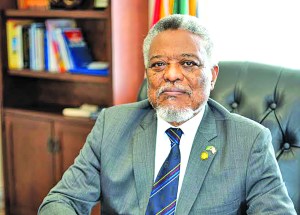Recognising the importance of having an economy that does not fully rely on oil and gas to thrive, Guyana’s former President and Prime Minister, Samuel Hinds, explained that innovation among stakeholders within the country would play a crucial role as the country aims to avoid the Dutch disease.
Hinds, who is now Guyana’s Ambassador to the United States, made this highlight during the virtual launch of the Oil Dorado book, hosted by John Mair.
When asked about the impact the discovery of oil has made on the country, the ambassador explained that the discovery of oil reserves off of Guyana’s cost has provided the country with a significant amount of finance, which has been pumped into the development of the country.
“For me, Exxon’s discovery of oil offshore was a matter of great joy for all of us Guyanese, because it provides an additional income for us to pay for the growth and development of our country and people, that we so badly need,” he said.
While the discovery of oil has fuelled the country’s growth, Ambassador Hinds has expressed his confidence in the country being able to develop without this resource.

“But let me say right away that without oil, the challenge before us, we would have met the challenge before us; and indeed, we had a great record of growth and development from 1992 without oil and with a great debt overhang. So, I’m happy about oil. I welcome oil, but we could live if there were no oil; we could have proceeded to grow and develop.”
However, the ambassador noted that high levels of innovation within the country must be present to ensure that the country’s growth can be maintained in a sustainable manner.
“I have been aware that two of the countries that have grown most rapidly during the 70s, 80s, and 90s were Japan and Singapore; and the Japanese used to say, ‘We thank the gods that we didn’t have any natural resources, so that we knew we had to work, using our hands and our brains and working together as a team to develop our country.”
He added, “So, I say the same thing: that people are most important. Finally, so whilst I welcome oil and I’m happy for oil, oil is not all; we could’ve made it without oil.”
Also present at the launch event was former British High Commissioner to Guyana, Greg Quinn, who highlighted the growth the country has seen over the years due to the discovery of oil.
He highlighted that when he was appointed as the British High Commissioner to Guyana in 2015, the country was the second poorest in the region. He added that development in the country during that period was also at a standstill.
In this regard, the diplomat noted that the discovery of oil has since transformed the country over the years.

“The world now in 2024 is somewhat different, to put it mildly; and the evidence of that is obvious to anyone who looks at the skyline of Georgetown, but also anyone who looks and travels outside of the capital and sees the roads, the stadiums, amongst many other things that are being built (throughout) the length and breadth of Guyana,” Quinn added.
However, he explained that even though the discovery of oil has benefited many Guyanese, there’re some sections of the population that have not felt the impact of the country’s oil wealth.
“That doesn’t mean it all is rosy in the Guyana garden. I think there are some pockets of society who don’t appear to have benefited from oil wealth, or at least you don’t think they’ve benefited from oil wealth. Some parts of society still feel impoverished. You know the cost of living has jumped, as goods and services have become more expensive. And the lack of people means that getting workers across all sectors of the economy is becoming increasingly difficult,” he expanded.
Moreover, as the world looks to transition to renewable sources of energy, Quinn highlighted, the Oil and Gas sector would remain in the picture of most economies for years to come.
“Yes, the world is moving to other sources of energy to address climate change, but the reality is oil and gas is going to be here for a long, long time. This is not just about energy and power, it’s about providing the things that allow us to live safe and comfortable lives: be that the plastics we rely upon, be that the clothing that we rely upon, be that the medicines,” he declared.
In this regard, the former British High Commissioner has urged Guyanese policy makers and stakeholders to make the most of this resource.
“The idea that we can turn oil and gas off overnight and keep living as we do is sadly a delusion. So, Guyana must ultimately make the most of this gift. That means ensuring oil and gas production continues for as long as possible. It means making use of the gas; not just re-injecting it into the field, but turning it into cooking gas, using gas to power, gas to liquids, all of which is within the Government’s plan.”
Discover more from Guyana Times
Subscribe to get the latest posts sent to your email.









